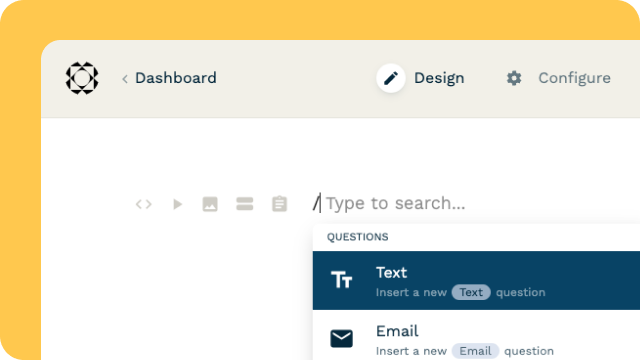
All Solutions

Explore all the solutions you can create with Paperform: surveys, quizzes, tests, payment forms, scheduling forms, and a whole lot more.
See all solutions











Connect with over 2,000 popular apps and software to improve productivity and automate workflows
See all integrationsProducts
Solutions
All Solutions

Explore all the solutions you can create with Paperform: surveys, quizzes, tests, payment forms, scheduling forms, and a whole lot more.
See all solutionsIntegrations

Connect with over 2,000 popular apps and software to improve productivity and automate workflows
See all integrationsResources
10 Digital marketing ideas for real estate businesses

Due to the COVID-19 pandemic and social distancing guidelines, over the past few years real estate agencies have changed how they market properties to prospective buyers.
From arranging virtual house tours to highlighting the potential for garden offices for remote workers, real estate agents have quickly adapted to thrive and survive.
Part of this has been a doubling down on digital marketing strategies. To find out what works in 2023 and beyond, we spoke to leading marketing experts to get the lowdown on the most effective digital marketing strategies for realtors.
What is real estate marketing?
Real estate marketing refers to the various strategies and tactics used by real estate professionals to promote their properties and services to potential buyers, sellers, and renters.
This can include a range of activities, from advertising, lead generation, and social media marketing to email marketing and search engine optimization (SEO).
As with any other form of marketing, the goal of real estate marketing is to attract and convert leads into clients, ultimately resulting in successful property sales and rentals.
Why is marketing important for real estate?
Remember the days when prospective home buyers would waltz down to their local realtor to look for a new home? That's not quite how it works now.
According to the National Association of Realtors, 41% of home buyers begin their search for their home online, with a—crazy!—97% using the internet at some point in their home-buying journey.
With these numbers alone, it's clear just how important digital marketing if for the real estate industry. It's the most effective way to get your property listings in front of your target market—buyers and tenants in your local area with the right budget.
What are the 4 P's of marketing in real estate?
The 4 P's of marketing, also known as the "marketing mix," are a framework used to guide marketing decisions and strategy. In the context of real estate, the 4 P's can be applied as follows:
- Product: The property being marketed. This includes considerations such as the type of property (e.g. single family home, condominium, etc.), features and amenities, location, and condition.
- Price: The cost of the property, including any commissions or fees associated with the sale or rental.
- Place: The location of the property and how it is being made available to potential buyers or renters (e.g. through a real estate agency, online listing, etc.).
- Promotion: The marketing efforts used to promote the property, including advertising, social media, public relations, and other tactics.
By considering each of the 4 P's, you can develop a strategy to effectively promote and sell or rent properties—even if you're not a marketing expert.
10 real estate digital marketing strategies from experts
We consulted digital marketing experts who've worked on marketing strategies for real estate agencies and individual agents, to help curate a list of worthwhile tips.
1. Consider outsourcing digital marketing
Digital marketing campaigns can absolutely be run in-house. But if you're a small agency or solopreneur, you mightn't have the time to churn out social media posts or tinker with PPC ads.
Even if you do, the time spent on marketing might be better spent on other parts of your job.
"We recommend outsourcing your digital marketing efforts to address the opportunity cost of doing these activities in-house," says Jamie Press, SEO and Content Strategist at Eurisko.
You're far better off focusing on what you are good at and leave the digital marketing strategy to an agency or consultant.
Outsourcing may seem like a more expensive option, but it's much cheaper than giving yourself a crash-course in marketing. Consider an international SEO company for good results and a wider reach. Larissa Murillo, Senior Marketing Manager at Marketgoo, suggests taking an"it depends" approach:
"If you're working solo, it makes sense to outsource marketing strategy and tasks to keep lean and focus on what you're good at.
But sometimes it's not within your budget! In that case you can't focus on everything—you need to pick the channels which will move the needle."
2. Pick the marketing channels that move the needle
Choosing the right marketing channels to focus on is essential for any industry, but particularly real estate, where competition is stiff. You'll need to carefully consider which channel will best reach your desired target audience.
For example, if your agency is targeting younger, tech-savvy buyers, you might want to focus on social media and email marketing. But if you're targeting older, more traditional buyers, you'll need to double down on print and direct mail.
By carefully considering their target audience and the channels that are most likely to reach them, you can effectively allocate your marketing resources and maximise their return on investment.
"Paid Google Ads, SEO and listing sites are the primary markets I'd focus on in real estate," said Dan Rich, a real estate SEO consultant based in Liverpool.
While building brand awareness through other channels such as display and video ads, and billboards is a good long-term brand play you can't beat the value of being right in front of a customer at the exact moment that they need you."
3. Focus on local SEO
When buyers head online to search for properties the same names dominate the listings: Zillow, Redfin, Domain, and many more depending on where you live.
Thinking about competing with these big players? You'd be fighting a losing battle. You're not going to be able to compete against giant companies with bottomless marketing budgets.
This may seem scary at first, but understanding this reality frees you up to focus on other strategies—like building your brand and nailing local SEO.
"Focus on building your brand as a local export," says Eric Doty, former SEO and PPC Lead at Real Estate Webmasters. "Build your personal brand on social by showcasing local businesses or niche locations."
You can still play in the SEO game by creating niched-down content on your website, like neighbourhood guides, relocation guides, best-of lists, and other hyper-local content that the Zillows of the world can’t produce.
Emma O'Connor, Head of Sales & Marketing at House Buyer Network, believes in the power of localised content.
"If I had to give just one tip, it would be to focus on content marketing. Build out silos that incorporate local marketing and answer all the questions your audience really want to know.
Once you have the content up and live, share it out across your socials. It's critical that you market your content and make it simple for your audience to share."
4. Provide virtual tours
Particularly post-pandemic, buyers want to visualise themselves in a home and take a look around digitally before booking a time to view it in person.
Virtual tours, despite looking expensive, are surprisingly simple to set up. Online tools like Kuuala and CloudPano, are great ways to create virtual tours that don't break the bank.
"Virtual tours are great for agents, because you can easily show off properties in a controlled way and grab the attention of potential buyers," says Dov Breuer, Real Estate expert and COO of Fixlers.
"It's more efficient too, since you can use the same virtual tour for everyone, rather than giving multiple tours to different buyers."
5. Embed videos in each listing
According to a study from Realtor.com, listings that include a video received 87% more views than those without one. If you've got the resources, it's a no-brainer.
Where virtual tours are more interactive hands-on experiences, real estate videos are typically shorter, focused presentation that includes narrated footage, photos and other visual elements to give buyers a sense of the features of the property.
They work effectively in tandem with virtual tours for a social-distancing friendly viewing experience. Once leads watch the video, they can look over the property in more detail through a virtual tour—no key or contact required.
6. Optimise your social media accounts
"Social media is a great way to increase brand awareness and build relationships with current and potential clients," says Zackary Smigel, founder of Real Estate License Wizard.
The chances are you've already got accounts on most social media platforms. That is a good start, but you'll have to make a bit more effort if you really want social to be contributing to your business.
First: decide what you want out of social. Do you want it to drive traffic? Or do you want to build your personal brand and leverage that for your business? Either one (or both!) is viable, but it requires a different approach.
Many real estate agents have find success on Instagram. You can post photos and videos with descriptions and contact details, and use hashtags—or targeted ads—to make sure your content is getting in front of the right audience.
Amy Vella from Ray White Maroubra, in Sydney, Australia, is a great example. She includes active listings, alongside relevant news updates, tips for home buyers, and testimonials from happy customers.
7. Nail your real estate agent bio
A real estate agent bio is a short, written profile that introduces you to potential clients, while showcasing your expertise and qualifications. Here are a few tips for writing one that stands out:
- Keep it concise: Your bio should be brief and to the point, typically no more than a few paragraphs.
- Highlight your experience and qualifications: Include information about your background in real estate, any certifications or designations you hold, and any relevant industry experience.
- Share your unique selling points: What sets you apart from other agents in your market? Do you specialise in a certain property type or have an area of expertise? Make sure it's crystal clear.
- Use a conversational tone: While it's important to be professional, your bio should also be approachable and relatable. Write in a friendly, conversational tone to help potential clients get to know you. A paraphrasing tool can help you easily achieve this with its different rephrasing modes i.e., Smooth, Formal, etc.
- Include a call to action: End your bio with a clear call to action, like inviting prospects to book a meeting, or visit your website to learn about your services.
9. Optimise your website for lead capture
A website serves as an online hub for your business, allowing potential clients to learn more about you and your services, view listings, and get in touch with you.
For real estate agents, it's also the place where you can capture and convert leads. These can come from a range of avenues—blog posts, landing pages, or even just a simple contact form.
Optimizing a website for lead generation is essential for real estate agents looking to attract potential buyers and renters (so every real estate agent, ever). A few ways you can do this:
- Use a clear and compelling value proposition: Make it clear to visitors why they should choose you as their real estate agent and what sets you apart from competitors.
- Include a clear call to action: Make it easy for visitors to take the next step by including a clear call to action, such as a "Contact Us" button or a form to request more information.
- Optimize your website for mobile devices: With the majority of website traffic now coming from mobile devices, it's important to ensure that your website is optimized for mobile.
- Use lead capture forms: Include lead capture forms on your website that allow visitors to easily request more information or schedule a consultation.
- Include testimonials: Social proof in the form of customer testimonials can help build trust and credibility with potential clients.
Using no-code tools like Paperform, you can have beautiful lead capture form done in minutes–complete with your own branding and ready to embed in your website or host on its own personalised URL.
10. Start an email newsletter
Most people don't just walk in off the street and buy a house. They keep an eye on the market for months or years. An email newsletter allows you to nurture warm leads over time, so when they're ready to buy you're the first stop.
Take Harris Partners for example. This Sydney-based agency sends out the Real Estate Report newsletter monthly. It's loaded with advice for buyers and renters looking for their next home.
Regular communication allows them to stay top of mind with potential clients, while building trust and credibility over time. And by highlighting new listings, they generate opportunities for buyers and sellers, providing two-way value for their subscribers and the agency.
You don't have to be a writer. Use your expertise and think about how you can provide value to your clients, whether that's commenting on local news, sharing market updates, or offering resources for aspiring first-home buyers.
Not sure where to start? Use the newsletter template below to start collecting sign ups:
newsletter signup form
Paperform: a Swiss Army Knife for realtors
Paperform offers a one-stop shop to help you generate more leads and keep your sales funnel well and truly full.
All our forms are customisable so you can make beautiful, branded forms that fit perfectly with your marketing campaigns. It’s also a cinch to export form data to spreadsheets, project management systems or your CRM as required
Here's just a quick overview of how you can use Paperform for your real estate business:
- Landing pages: For when you want to collect customer data, take payments, and sell products without the hassle of building a website.
- Lead generation templates: Never miss another lead again with these lead capture forms.
- Listing form templates: Create a simple, beautiful listing page for a property.
- Buyer questionnaires: Collect the details you need to nurture leads and convert them into customers.
- Appointment scheduling tool: Make it easy for leads to schedule a meeting with you.
Paperform can help you stay ahead of the curve. Try it out for yourself for free day, no credit card required.
Form a better life now.
Get your 7 day unrestricted trialSmileBox started in a bedroom and scaled to 30,000 orders. Here’s how founder Tom Wrench used Paperf...
When Kathleen Celmins launched her AI-powered app, GlowSocial, she quickly realized that building cu...
Paperform has been recognized as a 2026 G2 Best Software Award winner! It is an honour we are deeply...
Trying to decide between Zapier and Stepper? This in-depth comparison breaks down pricing models, wo...